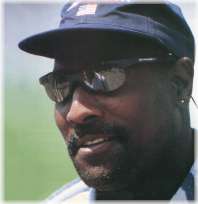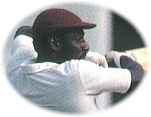Richards the leader
When things goan' good, you cahn touch we;
But leh murder start
And' ol man, you cahn fine a man to hole up de side. - West Indian poet
Edward Kamau Braithwaite **

HAD Clive Lloyd not been persuaded to change in his mind in 1983, Viv Richards would probably have had a much longer innings as captain. But that was not to be. Lloyd was persuaded to stay on. He stuck around for two years and during that time, there were many occasions when Richards felt that there was some kind of conspiracy to deny him the captaincy.
Given his nature, it is not surprising he felt this way. Lloyd had been a dominant force but never a domineering person. He was forceful but never ruthless. He was an excellent ambassador for the team and the various countries that were represented under the one banner. And above all, he had been winning like no-one had ever done before.
Admittedly, any captain would have suffered in comparison with Lloyd. In terms of ability, Richards was supreme; the team admired him for this. He led in the only way he knew - by example. Malcolm Marshall has said that Richards, despite his greatness, never considered his own needs to be above those of the team. Richards set high standards but his rebukes were sharp. There was a withering look for any player who committed a lapse in the field. And there were occasions when he behaved in a manner unbecoming of a captain, as when he entered the press box in the Caribbean in 1990 to threaten an English journalist who had criticised him in print.
What kind of captain was Richards? Nobody really has spoken out about him as Greenidge did about Lloyd. Some things are very clear: he was as single-minded as Lloyd but could not command the same kind of respect from all comers. He ensured that discipline was maintained and thus continued the winning streak which Lloyd had begun, ensuring that the team did not lose a series during his tenure at the helm. But for all that, some of the cohesion which had been achieved under Lloyd was lost.
 Lloyd always had a lot of say with the cricketing authorities. Lloyd himself said Richards would take over when he stepped down; he had the confidence to say it. Richards could not openly put a name to the man who would follow him. This was one big difference between the two: Lloyd had carte blanche when it came to team selection and Richards did not. The Antiguan's attitude was more confrontational whereas Lloyd had been more of a negotiator, though a very firm one.
Lloyd always had a lot of say with the cricketing authorities. Lloyd himself said Richards would take over when he stepped down; he had the confidence to say it. Richards could not openly put a name to the man who would follow him. This was one big difference between the two: Lloyd had carte blanche when it came to team selection and Richards did not. The Antiguan's attitude was more confrontational whereas Lloyd had been more of a negotiator, though a very firm one.
Despite having a talented bunch under his command, Richards never took the West Indies to the heights which Lloyd had. His one foray into the World Cup as captain ended in disaster with the team not even making the semi-finals. In fact, the West Indies' showing in one-day tournaments became progressively worse after Lloyd left. They have not won any one-day tournament which has involved all the Test-playing countries after the World Cup of 1979; the closest they have come was in Bangladesh in 1998 when they lost to South Africa in the Wills International Cup. (Update: Since then the West Indies have won the ICC one-day tournament in 2005.)
The loss of cohesion became evident when Richie Richardson took over and the team slowly began  going downhill. What transpired during Richardson's tenure is still not fully known but it is clear that team spirit had been lost. Individuals had become greater than the team. There have been hints that Richards played some kind of a role in ensuring that Richardson, a fellow Antiguan, followed in his shoes - when to all and sundry the man being groomed for the role was Desmond Haynes. In fact, the Barbadian was his vice-captain.
going downhill. What transpired during Richardson's tenure is still not fully known but it is clear that team spirit had been lost. Individuals had become greater than the team. There have been hints that Richards played some kind of a role in ensuring that Richardson, a fellow Antiguan, followed in his shoes - when to all and sundry the man being groomed for the role was Desmond Haynes. In fact, the Barbadian was his vice-captain.
When Richardson got the job, the general impression given was that a man who could lead for a number of years had been picked: Richardson was around 28. Maybe, they forgot that Haynes, though in his 30s, was going strong - and had much better credentials both as a batsman and a captain. Remember, Haynes quit the game in 1995 and that only because he had been overlooked tour after tour; Richardson quit in 1996. But had he not been forced out by his own teammates, one Brian Lara foremost, he could well have been captain even today.
However, inter-island rivalry has always had a great deal to do with matters cricketing in the West Indies and thus one cannot lay the blame for Haynes being overlooked entirely at Richards's door. One has to remember that from the time the West Indies had a black man as captain, there had been two captains from Barbados (the late Frank Worrell and Gary Sobers) and two from Guyana (Lloyd and Rohan Kanhai) by the time Lloyd's tenure ended. Richards was the first from Antigua, and Richardson the second; Jamaica got its turn with Courtney Walsh and then Trinidad and Tobago through Brian Lara. Then there have been Jimmy Adams (Jamaica) and Shiv Chanderpaul (Guyana).
Richards's record
| Tests | Innings | NO | Runs | HS | Ave | 100s | 50s | Ct | St |
| 121 | 182 | 12 | 8540 | 291 | 50.23 | 24 | 45 | 122 | 0 |
| Bowling | Balls | Mdns | Runs | Wkts | Ave | Best | 10WM | 5WI | SR |
| - | 5170 | 203 | 1964 | 32 | 61.37 | 2-17 | 0 | 0 | 161.5 |
| ODIs | Innings | NO | Runs | HS | Average | 100s | 50s | Ct | St |
| 187 | 167 | 24 | 6721 | 189* | 47.00 | 11 | 45 | 101 | 0 |
| Bowling | Balls | Mdns | Runs | Wkts | Ave | Best | 4WI | 5WI | Econ |
| - | 5644 | 26 | 4228 | 118 | 35.83 | 6-41 | 1 | 2 | 4.49 |
** Thanks to British West Indies fan Roger Lovell for providing the name of the poet.